Chinatown Blu-ray Movie
HomeChinatown Blu-ray Movie 
Paramount Pictures | 1974 | 131 min | Rated R | Apr 03, 2012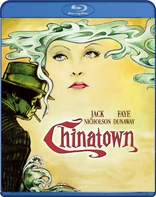
Movie rating
8.6 | / 10 |
Blu-ray rating
| Users | 4.5 | |
| Reviewer | 4.0 | |
| Overall | 4.0 |
Overview
Chinatown (1974)
A private detective in 1930s Los Angeles finds himself caught up in a web of deceit, corruption, and murder.
Starring: Jack Nicholson, Faye Dunaway, John Huston, Perry Lopez, John HillermanDirector: Roman Polanski
| Drama | Uncertain |
| Period | Uncertain |
| Crime | Uncertain |
| Psychological thriller | Uncertain |
| Film-Noir | Uncertain |
| Mystery | Uncertain |
Specifications
Video
Video codec: MPEG-4 AVC
Video resolution: 1080p
Aspect ratio: 2.35:1
Original aspect ratio: 2.39:1
Audio
English: Dolby TrueHD 5.1 (48kHz, 24-bit)
English: Dolby TrueHD 2.0 Mono (48kHz, 16-bit)
French: Dolby Digital 2.0 Mono
Spanish: Dolby Digital 2.0 Mono
Portuguese: Dolby Digital 2.0 Mono
Subtitles
English, English SDH, French, Portuguese, Spanish
Discs
50GB Blu-ray Disc
Single disc (1 BD)
Packaging
Slipcover in original pressing
Playback
Region free
Review
Rating summary
| Movie | 5.0 | |
| Video | 4.0 | |
| Audio | 3.5 | |
| Extras | 4.0 | |
| Overall | 4.0 |
Chinatown Blu-ray Movie Review
One of the 1970's best makes a fine Blu-ray debut.
Reviewed by Martin Liebman March 19, 2012Let sleeping dogs lie.
For every genre there's a handful of movies that absolutely define it: Saving Private Ryan the War film, Raiders of the Lost Ark the Adventure film, Pretty Woman the Fairy Tale Romance, High Noon the
Western,
The Exorcist the Horror film. The list is rather lengthy, several times as
long as the number of genres and sub-genres that exist out in the wild, pretty much all of these movies classics in one way or another, for whatever
reason(s),
and most with award after award and nomination after nomination heaped upon them. Director Roman Polanski's (Carnage) throwback 1974 Private-Eye film Chinatown
absolutely
defines the classic Mystery, a thematically dark and moody Noir-inspired picture that settles in so comfortably to its style, so convinces its audience
of its authenticity, that pretty much only the color photography distinguishes it from a classic picture hailing from a few decades prior, but then even
the color serves only to suck the audience further into the vividly-painted world and pull it deeper into the mystery and the characters who shape it.
But it's
the entire package beyond the look and plot that makes Chinatown an all-time classic picture. The script is marvelous, the performances
are
dazzling, and the direction proves unflinchingly effective. It's the kind of movie that's representative of the reason why people love movies, an
escapist
experience grounded in realism but playing with a larger-than-life heartbeat that takes over its audience's very essence until the gritty, unflinchingly
bold and dark finale.
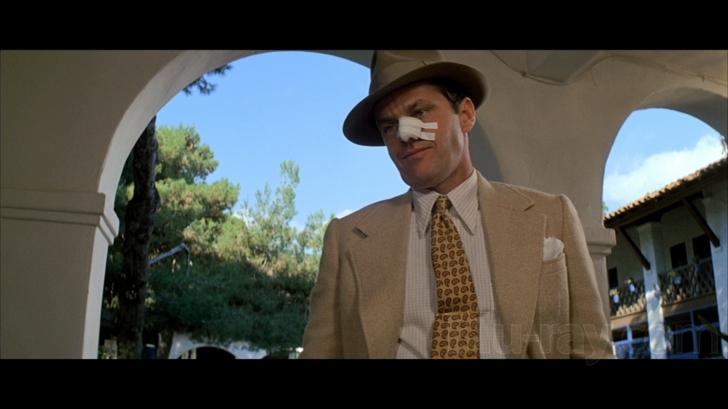
Of course it hurts!
Los Angeles-area private detective Jake Gittes (Jack Nicholson) has investigated more than his fair share of infidelity cases; cheating husbands and wives and suspicious spouses seem a dime a dozen in the greater L.A. area, and Jake's seen far too many broken hearts and bad deeds for one lifetime. When a woman comes to him in search of confirmation of her suspicions of an unfaithful husband, Gittes thinks nothing of it, even brushing her off and encouraging her not to dig any further. She persists, and her husband's name strikes a chord: he's Hollis Mulwray (Darrell Zwerling), the city of Los Angeles' Chief Engineer for water and power. That's significant for two reasons: first, Mr. Mulwray is a public figure of sorts, and second, Los Angeles is experiencing a catastrophic drought, and the man in question opposes a proposed dam which might help alleviate the drought conditions, citing a previous dam failure and refusing to repeat past mistakes. Gittis takes the case and cracks it easily, but his answers lead to only more questions. When pictures of Hollis and another woman appear as front-page news, Gittis is confronted by another woman, Evelyn (Faye Dunaway), the real Mrs. Mulwray. Suddenly, Gittis' simple investigation doesn't seem so simple anymore. As he continues his investigation into Mr. Mulwray and unearths the truths surrounding the drought and the opportunists who would profit from it, he becomes entangled in a deadly web of deceit and danger that can only lead to unspeakable truths.
Style and story represent the two primary elements that shape the success of Chinatown, the two certainly not mutually exclusive and all of the supportive elements equally distributed to the task of reinforcing both with verve and realism. In Chinatown, one could not be without the other; the style and story are so dependent one on the other that a flaw in one is a flaw in both, but Polanski, his team, and the cast all ensure that there's really no flaw to be found. Chinatown is as rock-solid as they come, a picture that might not suit all tastes -- it's slower and more deliberate than most, even many of its own kind -- but that certainly takes full advantage of the medium in shaping the experience by absolutely recreating its setting and polishing its story. From the opening moments forward -- before a character is even seen -- Chinatown defines its place and time through music and title script alone; the smooth and melancholy beats combined with something of a sepia-inspired backdrop and exacting cursive-and-block font set the stage for a brooding story from a bygone era where the style is figuratively black-and-white but the plot, places, and people are literally anything but. The film's stylings are uncannily authentic, so much so that the backdrop becomes something more than a recreation of a place and time critical to the story. It's a time capsule that recreates an era of civilization and an era of film; it's not as literally dark as its Noir-inspired peers, but it certainly is figuratively so. All of the classic elements are in place well beyond the mere exterior fašade, going all the way down to the dark, gritty unseen but certainly understood soul that's the true center and driving force behind these sorts of pictures.
The story enjoys the same attention to detail as the stylings. It's old-fashioned but plays with ever-relevant themes of power, politics, and greed. Those things drove dealings in the 1930s, they drive dealings today, and they'll drive dealings tomorrow. In that way, the film will never lose its thematic relevance, though certainly its expertise in other areas carry it just as far. The plot is smart and involved, slow to develop but nuanced and intelligent. The characters are far more complex than the usual single-dimension players who shape lesser films of the same nature. Their pasts are haunting, their presents dangerous, their futures uncertain. The finely-drawn characters -- appearing perfectly assembled both inside and out -- give shape and purpose and urgency to the plot beyond the usual gratification that comes from the slow unravel of the the mystery alone. Chinatown involves the audience in the story and ensures they care about both the context of the mystery and the many subplots that give it that shape, purpose, and urgency. The water crisis and (mis)management serve only to allow for a greater exploration of the characters, a backdrop against which they may work and expose others as they expose themselves, the best and worst they have to offer. It all comes back to just how convincing the movie is, beyond the costumes and cars but as it digs deeply into the people who will either see it through or stop at nothing to put the brakes on a wrong and bring to light the darkness behind it.
Lastly, the performances on either side of the camera round Chinatown into a powerhouse of an all-time classic picture. Roman Polanski's direction isn't visionary, but it's decidedly steady and unobtrusive while still showing a certain style of accentuation and attention to detail that's critical in creating just the right mood, in drawing the best out of the already unflappable script form the hand of Robert Towne and from the actors who play the parts Towne has envisioned. Likewise, the cinematography is steady, the score unwaveringly authentic to the time and true to the story, and the editing just so to keep the movie going but maintaining that deliberate slow-to-reveal pacing that's critical in shaping a movie of this style and structure. The performances are great, dominated by Jack Nicholson in what remains one of the best efforts of his career, chronologically after Easy Rider but before The Shining and One Flew Over the Cuckoo's Nest. Nicholson's performance uncannily captures the character with a precision rarely achieved in film; the Oscar-nominated performance sees the actor every bit as an authentic private investigator who's all too human but unflappably dedicated to the job and the task at hand while maintaining a core code that doesn't lead him too far down the darkened path. He conveys the plot as much through actions and deeds as looks and words; he's the connection to the audience, the classic lead character who guides the viewer through the story as he himself traverses it, both going in blindly at first and only with as much information as is discovered along the way. The script is never transparent and the audience never ahead of Nicholson's Gittes. His physical and emotional wounds become the audiences' physical and emotion wounds, the bandage and stitches on his face a reminder not only of the seriousness of the story and the consequences of the action, but of the fragility of the character and, by extension, the audience, causing the viewer to grip a little more tightly to his or her seat and truly come to care about the characters and see the mystery resolved as it must be and not how it may be.
Chinatown Blu-ray Movie, Video Quality 
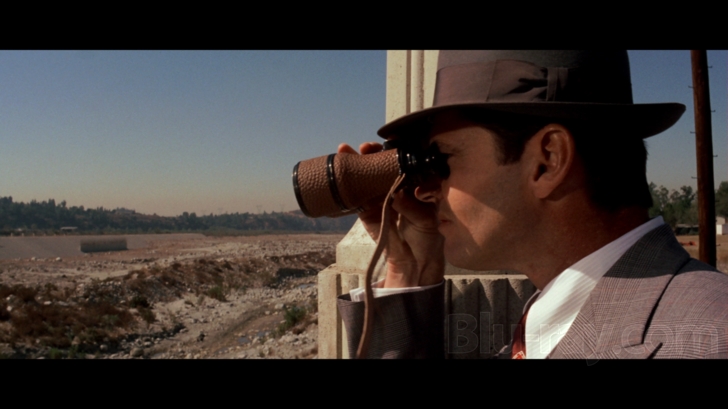
Chinatown's 1080p Blu-ray transfer is steady and satisfying. Though light banding appears in one or two shots, a speckle or scratch or line occasionally pops up, edges appear prone to softness, blacks sometimes crush out details, and faces sometimes appear a slight bit pasty, the net effect of all these observations is rather minimal. On the whole, the image enjoys a rather natural appearance, accentuated by crisp details and steady colors. Period clothes are nicely revealing of the fabrics and seams. Faces are often well-defined, as are both city buildings and the rocky terrain out by the reservoir. Details aren't always razor-sharp -- that softness lurks around some edges -- but a light layer of grain is retained and solidifies a fair film-like image. Colors are steady throughout. Plush green lawns look fantastic, and suits and buildings appear balanced and natural. This isn't the most vibrant image out there, but all of the hues are handled with care. Chinatown's 1080p transfer doesn't clock in at the absolute top of the high definition heap, but chances are fans will enjoy Paramount's offering.
Chinatown Blu-ray Movie, Audio Quality 
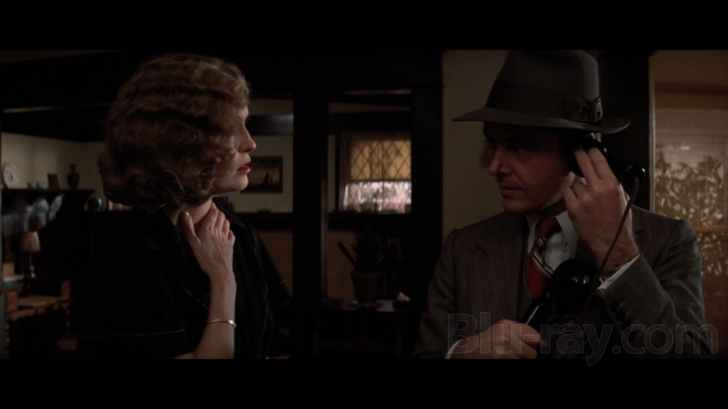
Chinatown makes its Blu-ray debut with a Dolby TrueHD 5.1 lossless soundtrack. The original restored Dolby TrueHD mono soundtrack is also included. Listeners who choose the 5.1 track won't find a significantly different experience over the mono track. The added channels don't mean a barrage of new sounds. Spacing is a little more authentic, but the action remains largely focused straight up the middle. Music plays with a decent sense of space, good clarity, and adequate body. Minor background and ambient effects rarely move past the front channels: light city din comes through Gittis' office window, seagulls alert listeners to their presence, ocean waters gently roll off to the sides, and microphone reverberations don't find much spacing. Gunshots ring out with adequate authority, and water rushes with a fair sense of power. Dialogue is steady, perhaps a hair shallow at times, and never playing with tremendous volume. The 5.1 track is classy and reserved; it opens up the world of Chinatown a little bit more than does the mono presentation. Purists will want to stick with the original, but choosing the 5.1 track doesn't badly sacrifice the integrity of the original intent.
Chinatown Blu-ray Movie, Special Features and Extras 
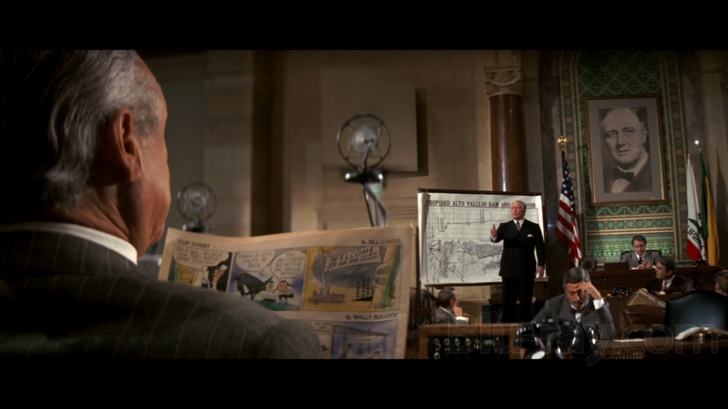
Chinatown contains an extensive assortment of extra content, headlined by an audio commentary track. A small six-page booklet is included
in the
case.
- Audio Commentary: Screenwriter Robert Towne and Filmmaker David Fincher speak lovingly about the film. Discussions include the opening titles, their first exposure to the film, the score, the work of the cast, character construction and detail, Polanski's contributions, the film's place in Nicholson's career, set decoration and shooting locales, the importance of precise wardrobe to shape the characters, the details of the story and themes, research for the script, and plenty more. Despite a few silent stretches, this is a high quality commentary that's a must-listen for fans.
- Water and Power (480p, 1:17:50): A three-part feature broken down into The Aqueduct, The Aftermath, and The River & Beyond. Chinatown Screenwriter Robert Towne visits the L.A. Aqueduct for a detailed look at its purpose, history, how it works, the role of the aqueduct in the film, the film's importance in L.A. period history, the area today, geography, politics, the environmental impact, waste, the division and utilization of resources, water conservation, and more.
- Chinatown: An Appreciation (480p, 26:15): Steven Soderbergh, Kimberly Pierce, Roger Deakins, and James Newton Howard discuss their first impressions, the way the picture grows with multiple viewings, the themes, the quality of the script, intertwining fiction with factual history, the basics of the plot and those things which lie beyond it, the work of the filmmakers and the cast, the score, the ending, and more.
- Chinatown: The Beginning and the End (480p, 19:28): Roman Polanski, Jack Nicholson, Robert Towne, and Producer Robert Evans discuss the origins of the story, the planned trilogy, the real history that shaped the story, the process of writing the script, getting the movie off the ground, Polanski's craftsmanship, disagreements between the crew, changes to the ending, and more.
- Chinatown: Filming (480p, 25:45): Discussions include shooting in both studios and on-location, filmmaking techniques and visual style, an early change in cinematographer, Gittes' name, Nicholson's performance, Polanski's small part in the film, anecdotes from the set, shooting various scenes, and more.
- Chinatown: The Legacy (480p. 9:37): Polanski, Nicholson, Evans, and Towne share their thoughts on Goldsmith's score and the picture's release, instant success, nominations, and lasting qualities.
- Chinatown Theatrical Trailer (1080p, 3:20).
Chinatown Blu-ray Movie, Overall Score and Recommendation 
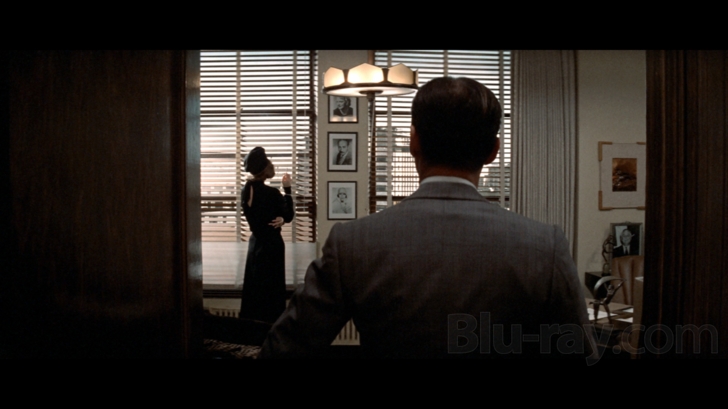
Chinatown is one of those rare classic pictures that absolutely defines a style and an era. It's proof of the timelessness of film and its power as an art form, not only as a lasting medium but as a time capsule that may be crafted in any time and in any place to take audiences on a journey to what was and, on a few reels of film or now on a disc or disk drive, anyway, still is. Roman Polanski's Chinatown defines cinema as art and escapism combined into one. The picture is deliberate but authentic and gripping. The recreation of the era is faultless and the technical merits above reproach. It's not Nicholson's best work, certainly not a knock on the performance or the film in any way but a testament to the incredible roles he's played through his storied career. It's a complete film in every regard and a deserved classic that's been released to Blu-ray in a package worthy of its quality. Paramount's latest classic film release features quality video and audio to support a good assortment of extras. Very highly recommended.
Other editions
Chinatown: Other Editions
Similar titles
Similar titles you might also like

The Long Goodbye
4K Restoration
1973

Devil in a Blue Dress 4K
1995

The Black Dahlia
2006

L.A. Confidential
1997

Brick 4K
2005

Cutter's Way
Limited Edition to 3000
1981

Inherent Vice
2014

Tinker Tailor Soldier Spy 4K
2011

Murder, My Sweet
Warner Archive Collection
1944

The Killers
1946

Mildred Pierce 4K
1945

Following
Theatrical Version and Chronological Edit
1998

The Man Who Wasn't There
2001

Detour
1945

Klute
1971

Mystic River
2003

Double Indemnity 4K
1944

Blue Velvet 4K
1986

Night and the City
American and British Versions
1950

Kiss Me Deadly
1955



